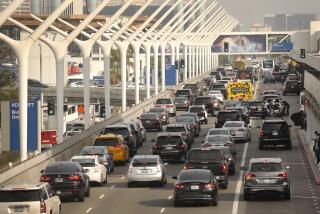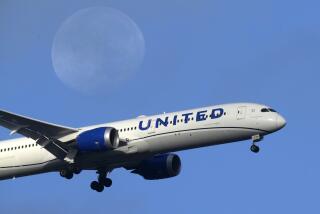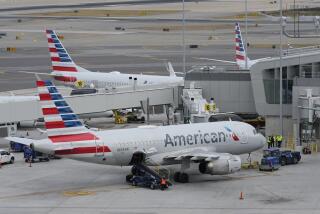Airline group seeks to modernize booking system
A trade group for the world’s airlines is pushing to modernize a decades-old booking system to help speed along the latest airline trend — the sale of customized fare packages.
Behind the effort is the International Air Transport Assn., the trade group for about 240 of the world’s largest airlines. The group filed an application with the U.S. Department of Transportation last week to upgrade the computer system used by travel agents and online travel sites such as Orbitz and Travelocity.
The group wants the ability to sell you more than just a seat on a plane. Most airlines can now offer, through their own websites, customized packages that include such extras as upgraded seats, early boarding and onboard drinks.
But the trade group says that the 40-year-old computer system used by travel agents and online travel sites is so antiquated that it can only provide simple flight schedules and fares.
The proposed upgraded system would also let airlines identify you through your loyalty reward number or other information to sell you personalized deals.
“If you are an airline, you don’t know what your customer is buying until after the purchase is done,” said Perry Flint, a spokesman for the IATA, which is based in Geneva.
The existing system cannot, for example, offer the special deal from AMR Corp.’s American Airlines called Choice Plus. The deal includes an economy seat, one free checked bag, a free drink, early boarding and no charge to change flights at the last minute.
American Airlines offers the deal through its own website.
Critics of the proposal worry that it will force passengers to give up personal data and make it harder for them to easily compare fares of different airlines.
Kevin Mitchell, chairman of the Business Travel Coalition, an advocacy group for business travelers, called the proposal “nothing less than an ill-considered public and government-relations nightmare.”
Flint disagrees, saying passengers will still be able to compare fares to find the lowest price and are not obligated to give personal information.
“This is a standard that we are putting out,” he said. “It’s up to the market to put it in use.”
The IATA hopes to begin testing the new system next month and, if all goes well, have it offered widely by 2016, Flint said.
Federal budget cuts hurt hotels
The automatic federal budget cuts brought about by so-called sequestration are already inflicting pain on the hotel industry.
Federal agencies responded to the cuts by slashing nonessential travel by federal employees, who represent at least 30% of business for some hotels.
This month, the 67th annual National Defense Transportation Assn. Forum & Expo, which was to open in September in San Antonio, was canceled because of the budget cuts. The association is a nonprofit educational group focusing on transportation issues for the military.
Travel industry leaders worry that further federal cuts will continue to hurt an industry that supports about 14 million workers.
“We are seeing evidence of cancellations of federal agency travel all across the board,” said Erik Hansen, director of domestic policy for the U.S. Travel Assn., the trade group for the nation’s travel industry.
Hotel tipping is not universal
If you never tip a concierge when staying at a hotel, you are not alone.
According to an online survey of nearly 700 travelers, 55% said they never tip a concierge while 23% said they tip $2 to $4 a day.
The survey by hotel booking site Tingo found that housekeepers get better treatment. Among hotel guests, 40% said they tip $2 to $4 a day and 15% tip $5 to $7. Only 19% said they never tip a housekeeper.
“I always tip hotel maids, and you should do it as soon as you check in, and thereafter each day of your stay,” said George Hobica, founder of Airfarewatchdog, a low-airfare alert and air travel advice website. “You’ll be surprised how much extra attention you get.”
The tips might cut down on the number of times housekeepers barge into your room without knocking.
According to the study, 33% of travelers said housekeepers have walked in on them while they were either sleeping, getting out of the shower, getting dressed or using the toilet.






